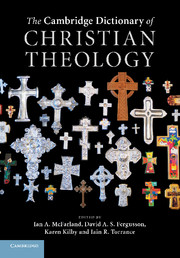G
Published online by Cambridge University Press: 05 June 2012
Summary
Gay and Lesbian Theology: see Queer Theology.
Gender: see Feminist Theology; Sexuality.
Gilson, Étienne Étienne Gilson (1884–1978) was a Parisian Thomist (see Thomism). Like C. Péguy (1873–1914) and J. Maritain (1882–1973), he listened spellbound to the lectures of philosopher H. Bergson (1859–1941) at the Collège de France. He simultaneously heard L. Lévy-Bruhl (1857–1939) lecture on D. Hume (1711–76). While Bergson attuned Gilson to metaphysical realism, Lévy-Bruhl inspired and trained him to be a historian of ideas. Gilson wrote his PhD under Lévy-Bruhl on R. Descartes (1596–1650). His first major works were on T. Aquinas (1919) and Bonaventure (1924). After founding the Institute for Mediaeval Studies in Toronto in 1929, Gilson taught half the year in Paris, as professor of medieval philosophy at the Collège de France, and half in Toronto.
Gilson made three principal contributions to twentieth-century theology. Neo-Scholastic ideology and the exigencies of Catholic apologetics had made Aquinas the theoretical standard by which to judge, and the historical model to which to assimilate, the other medieval thinkers (see Scholasticism). Gilson's first service to modern theology was as a historian. With his highly readable, text-based studies of Augustine, Bonaventure (1221–74), Bernard of Clairvaux (1090–1153), P. Abelard (1079–1142), Dante (ca 1265–1321), J. Duns Scotus, and lesser lights, Gilson demonstrated the diversity of medieval Christian thinkers. Such historical research by a respected historian and Thomist laid the groundwork for the ressourcement movement of the 1950s.
- Type
- Chapter
- Information
- The Cambridge Dictionary of Christian Theology , pp. 197 - 204Publisher: Cambridge University PressPrint publication year: 2011
References
- 5
- Cited by



